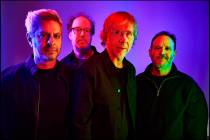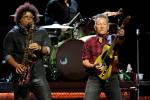How Luis Fonsi created the most popular song of all time
It’s inescapable, like death, but with dancing hair in place of toe tags.
“Despacito.”
You’ve most likely heard it even if you don’t know it.
The reggaeton-pop hybrid, with innuendo-heavy lyrics about certain bedroom activities that lead to the aforementioned swaying of manes, has in the span of eight months become the biggest song of all time.
“Despacito,” which translates to “slowly,” has defied its title en route to swiftly becoming the silver-backed alpha male gorilla of the airwaves.
That it’s sung mostly in Spanish makes the song’s explosive rise to ubiquity all the more unprecedented.
Released in January, “Despacito” has topped the charts in 39 countries, from Luxembourg to Lebanon, Portugal to Paraguay.
It took but six months for it to become the most streamed song ever at 4.6 billion hits and counting, with a smash remix featuring Justin Bieber adding to those gargantuan numbers. Its video is the most-played clip in YouTube’s history, and the song has sat atop the Billboard Top 100 for 16 weeks, tying the record set by Mariah Carey and Boyz II Men’s “One Sweet Day.”
As far as earworms go, it’s like Peyton Manning humming the Nationwide Insurance jingle times the “Mission: Impossible” theme to an exponent of “Who Let the Dogs Out.”
Currently, the man who wrote it is on the other end of the phone, calling in from a tour stop in Argentina.
He estimates that he’s had around four days off this year since “Despacito” changed his life forever.
“Three weeks ago, I couldn’t walk the streets of Egypt,” marvels 39-year-old Puerto Rican singer Luis Fonsi, who’s been a well-known name in Latin music circles since 1998 but never like this. “My audience has grown from a typical Latin audience to a worldwide audience. That’s something very new to me. It gives you that first-day-of-school feeling, like you’re starting all over, and you have to go prove yourself all over again for this new audience that is starting to know you through one song.”
To brand “Despacito” a mere song is almost to sell it short: It’s become a pop cultural cruise missile.
How did it become so?
Well, it’s an amalgamation of things: breezy, yet irrepressible reggaeton rhythms, hip-hop flourishes via a guest spot from Daddy Yankee, Bieber singing in Spanish for first time on the remix, a melody as infectious as the whooping cough and slyly suggestive lyrics meant to serve as a portal from the dance floor to the boudoir.
“It doesn’t cross that line between sexual and sensual,” Fonsi says. “When we put it together, we wanted to have the right amount of pop, the right amount of urban, the right amount of musicality where I felt comfortable being a pop artist defending this hybrid.
“I just wanted to make a huge song for my Latin audience,” he continues. “Genre-wise, it was already a little bit of a change, so I was concentrating on that, concentrating on surprising my audience with this new sound. That’s where my head was at at the time.”
Still, Fonsi says that he knew early on that he had a monster on his hands.
“From the moment we released it, I would say day three, we just knew that it was going to be a rocket,” he recalls. “Every step of the way, it just really felt like we had something different, something special. We weren’t reinventing the wheel, we were just giving people something unique. But you never know how people are going to react.”
Well, they reacted like drunks at an open bar, where too much is never enough.
Said response added another dimension to “Despacito.”
It’s become a gateway to Latin American culture in general, teaching folks from here to the Czech Republic how to say “I want you to teach my mouth your favorite places” in Spanish.
“We’re living in times where we want to separate people, we want to build walls, and here’s this song that’s actually building bridges,” Fonsi says. “It’s all about being able to break barriers and putting Latin music where it needs to be. This has been a group effort. It’s been many years in the making, from the pioneers who did the crossovers, the Julio Iglesiases, the Jose Felicianos, the Gloria Estefans, the Ricky Martins, who have really just pushed that door open, little by little, song by song. I think ‘Despacito’ gave it that last push.”
Contact Jason Bracelin at jbracelin@reviewjournal.com or 702-383-0476. Follow @JasonBracelin on Twitter.




























